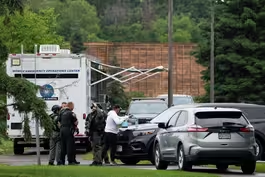
Former U.S. ambassador analyzes rising Israel-Iran conflict
Clip: 6/14/2025 | 5m 43sVideo has Closed Captions
Former U.S. ambassador to Israel analyzes rising Israel-Iran conflict
Israel and Iran traded more missile strikes on Saturday. Iran’s state television reported that an Israeli airstrike on a housing complex in Tehran killed about 60 people, including 20 children. In Israel, Iranian missiles and drones have killed three and wounded dozens. Daniel Shapiro, former U.S. ambassador to Israel, joins John Yang to discuss the two countries’ most intense fighting in decades.
Problems playing video? | Closed Captioning Feedback
Problems playing video? | Closed Captioning Feedback
Major corporate funding for the PBS News Hour is provided by BDO, BNSF, Consumer Cellular, American Cruise Lines, and Raymond James. Funding for the PBS NewsHour Weekend is provided by...

Former U.S. ambassador analyzes rising Israel-Iran conflict
Clip: 6/14/2025 | 5m 43sVideo has Closed Captions
Israel and Iran traded more missile strikes on Saturday. Iran’s state television reported that an Israeli airstrike on a housing complex in Tehran killed about 60 people, including 20 children. In Israel, Iranian missiles and drones have killed three and wounded dozens. Daniel Shapiro, former U.S. ambassador to Israel, joins John Yang to discuss the two countries’ most intense fighting in decades.
Problems playing video? | Closed Captioning Feedback
How to Watch PBS News Hour
PBS News Hour is available to stream on pbs.org and the free PBS App, available on iPhone, Apple TV, Android TV, Android smartphones, Amazon Fire TV, Amazon Fire Tablet, Roku, Samsung Smart TV, and Vizio.
Providing Support for PBS.org
Learn Moreabout PBS online sponsorshipJOHN YANG: And now to the Middle East where Israel and Iran have traded more missile strikes.
Iran state TV reported that about 60 people, including 20 children were killed by an Israeli strike on a housing complex in Tehran.
In Israel, Iranian missiles and drones have killed three and wounded dozens.
Drone footage from south of Tel Aviv shows the damage there.
The sixth round of U.S.-Iran talks in Oman on Tehran's nuclear program scheduled for tomorrow have been canceled.
Daniel Shapiro was U.S.
Ambassador to Israel from 2011 to 2017.
Mr.
Ambassador, Israel says one of their main goals is to destroy Iran's ability to create a nuclear weapon.
Can the Israeli military, does it have the capability to do that by itself?
DANIEL SHAPIRO, Former U.S.
Ambassador to Israel: Israel has already, since it started these strikes 48 hours ago, done significant damage to the Iranian nuclear program.
They've struck the Natanz enrichment facility, perhaps destroyed it.
They're attacking another facility in Isfahan.
But the big question is, do they have the capability to take out the deeply buried underground facility called Fordow, that has generally been assessed to be reachable only by heavy bombs and strategic bombers that only the United States possesses.
But I wouldn't underestimate Israel's ability to find solutions.
They've shown incredible ingenuity and creativity and in pager and beeper attacks against Hezbollah, in attacking a weapons facility in Syria, and even in these strikes and smuggling drones into Iran that it used in the early hours.
So they may have solutions and surprises that we haven't thought of, but that's really the key test.
Can they destroy or would somebody else help them destroy the ford of underground facility?
JOHN YANG: Where is Iran's retaliation going to go?
Can they escalate what they've been doing?
They would just set.
Not just, but they've been sending missiles and drones in.
Is there more in their back pocket, as it were?
DANIEL SHAPIRO: Iran could escalate more.
Until now, they've mostly used ballistic missiles against Israel.
Some have gotten through the Israeli air defenses, which are supplemented by American air defenses.
They've caused some casualties, but they haven't caused real strategic damage, at least that we're aware of.
What they might try to do, especially as that inventory of ballistic missiles goes down, is turn toward energy targets in the Gulf.
They blame Gulf countries just as they blame the United States for supporting Israel, even though those countries have distanced themselves from this attack.
But if they decide to blockade the Strait of Hormuz, if they decide to hit some of their neighbors energy targets, or even if they decide to hit American military bases in the Gulf, that would be a big escalation.
JOHN YANG: How likely is that last point they're targeting U.S. military bases?
DANIEL SHAPIRO: I think it's unlikely in the near term because they don't want the United States to get involved in this war.
They understand the United States would bring even heavier capabilities and particularly that toward that very special nuclear facility in Fordow if it got involved.
So their goal is to keep the United States out.
Obviously, strikes against U.S. targets would almost certainly bring reprisals from the United States.
JOHN YANG: Israel said that Iran hitting or targeting civilian areas in Israel crossed a red line.
Here's Prime Minister Benjamin Netanyahu.
BENJAMIN NETANYAHU, Israeli Prime Minister (through translator): We have paved a path to Tehran.
We will hit every site and every target of the Ayatollah's regime.
And what they have felt so far is nothing compared to what they will be handed in the coming days.
JOHN YANG: Nothing compared to what they'll be handed.
As this continues, you know, Israel says it's only been targeting military and nuclear sites.
As the escalation goes on, could that change?
DANIEL SHAPIRO: Well, I think that's their goal.
Their goal is to prevent Iran from ever having the capability to build a nuclear weapon.
So it's the nuclear sites.
Their other goal is to prevent Iran from having the ballistic missile capability to target Israel as it's been doing.
And they generally want to degrade the regime and the military and the Iranian Republican Guard Corps that has been the shock troops that have supported all the terrorist proxies that have attacked Israel through the years.
So they have many targets they haven't yet hit.
They've hit senior military and IRGC and scientists, leaders as part of this early wave.
I think there are many more such targets they could go after.
They think might shake the foundations of the regime.
JOHN YANG: The prime minister also at one point this week addressed the people of Iran.
Is regime change possible?
DANIEL SHAPIRO: I don't think regime change is a realistic goal and probably not even a legitimate goal to try to pursue through military means, whether by Israel or the United States or others.
But we do know that the Iranian people, many of them view this regime as a deeply brutal, corrupt, mismanaged regime that has made their lives miserable, that has squandered many resources toward wars against Israel that do nothing to improve their lives.
So there could come a tipping point when pressure from outside gives strength and gives encouragement to Iranian people on the inside to turn against the regime.
And so we can't rule out the possibility, just as it happened in Syria earlier in this drama several months ago, that the Iranian regime could face a moment of truth.
JOHN YANG: President Trump seems to be suggesting that what Iran is going through may push them at the negotiating table.
Negotiations were called out this weekend.
Could Iran return to the table after this?
DANIEL SHAPIRO: Well, they could.
They won't.
In the first days of this, it would look like a capitulation.
And the standard that President Trump has set for those negotiations is that Iran eliminate its nuclear enrichment program.
And that's really a key demand because as long as they retain that capability, they basically retain the ability to build a nuclear weapon.
It's too dangerous to let them have it.
So if they're willing to come back to the table on that basis, maybe there's room for talks.
They may only be willing if they fear that Israel or even if the United States might bring military pressure to bear to actually destroy the last remaining nuclear facilities they have.
JOHN YANG: Former ambassador Daniel Shapiro, thank you very much.
DANIEL SHAPIRO: Thank you.
Historian discusses message Trump’s military parade sends
Video has Closed Captions
Clip: 6/14/2025 | 5m | Military historian discusses the message Trump’s military parade sends to the world (5m)
Millions turn out for ‘No Kings’ protests across the U.S.
Video has Closed Captions
Clip: 6/14/2025 | 4m 39s | Millions turn out nationwide for ‘No Kings’ protests against Trump administration (4m 39s)
News Wrap: Crews work to identify Air India crash victims
Video has Closed Captions
Clip: 6/14/2025 | 1m 41s | News Wrap: Crews work to reunite remains of Air India crash victims with families (1m 41s)
Rep. Finke responds to assassination of Minnesota lawmaker
Video has Closed Captions
Clip: 6/14/2025 | 6m 16s | State Rep. Finke responds to assassination of Minnesota lawmaker Melissa Hortman (6m 16s)
Providing Support for PBS.org
Learn Moreabout PBS online sponsorshipSupport for PBS provided by:
Major corporate funding for the PBS News Hour is provided by BDO, BNSF, Consumer Cellular, American Cruise Lines, and Raymond James. Funding for the PBS NewsHour Weekend is provided by...















